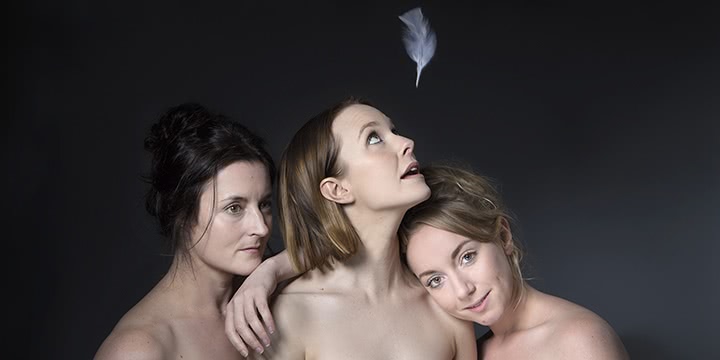For most theatre directors, the staging of any play begins with a simple table read.
It’s generally accepted as the easiest way to give all those involved a broad understanding of the text at hand, while helping to solidify the basics of the play’s who, what and where. By that measure, Kevin Jackson, the man behind Sport For Jove’s upcoming production of Anton Chekhov’s Three Sisters, is not like most theatre directors.
“We didn’t do a table read,” he says. “I don’t like table reads. Most of the actors don’t know what they’re doing, so it usually sounds terrible and everyone’s depressed at the end.” He barks out a laugh. “Instead, we just talked about the play and Chekhov generally. All the background material. I gave them a whole package of research material to paddle through as well, so we could talk about those sorts of things and ask questions in preparation for putting the play on the floor.”
Though the production’s cast and crew had a working knowledge of Chekhov, Jackson insisted the creatives step up their game, not-so-gently thrusting them headlong into the celebrated Russian writer’s entire oeuvre. “Most of the cast are graduates from drama schools, and Chekhov is one of the primary learning tools used in any kind of dramatic training, so they all had knowledge of his work,” Jackson explains. “Certainly, my requirement was that they had read all of the plays, and even some of the short stories.”
As far as Jackson is concerned, to understand Chekhov is to understand the machine that drives all contemporary theatre. Chekhov spent many years working alongside the famous cultural theorist Konstantin Stanislavsky, and their joint interest in the pure, untarnished human emotion that they argued should underpin any great work of art means that both titans remain a cornerstone of theatre study courses around the world.
“Almost all Western theatre is based on Stanislavsky, and he and Chekhov were intertwined,” Jackson says. “Chekhov was working in parallel with him, so Stanislavsky’s [theories] and Chekhov’s work knit together.
“I teach at a film school that goes straight to camera, and even there [it is important]. Whatever kind of acting you’re going to do, whatever medium, you need to have an understanding of Stanislavsky. Because he and Chekhov were working [in tandem], to use Chekhov’s work is to have an understanding of that theory that underpins all contemporary theatre. They both [wrote about] the core foundation that underpins every actor’s work.”
In deciding to stage a new version of Chekhov’s celebrated Three Sisters – a dark, melodramatic work that follows a trio of heroines as they battle forces both interpersonal and societal in turn-of-the-century Russia – Jackson recruited his longtime friend and associate Karen Vickery. The pair were determined to put a respectful yet fresh spin on a play they feel hasn’t lost an iota of its power in the century since it was first performed. “Karen is an actor, teacher, director,” Jackson says. “She’s of Russian parents, so she speaks, reads and writes Russian.”
Although the last 20 years have seen a rise in the theatrical practice of plonking legendary plays in contemporary settings, with overzealous directors switching up location and dialect en masse, Jackson says he was determined to keep the play locked in its original timeframe.
“The play still speaks today,” he says. “The great thing about Chekhov is his understanding of humanity. In the process of rehearsal, we realised that as we today live in fear of terrorism, and computer developments, along with the rapaciousness of corporations, that is what [the characters] in the play fear too. They all fear modernity and they all fear change. Those themes that were relevant in 1901 are still relevant today in 2016. We didn’t have to update the language or put ‘fuck’ into it or update the location. It didn’t need those things. This play speaks pretty powerfully in those symbols and imagery, and its themes and language are interconnected anyway.”
Jackson says the alterations he and Vickery have made to the play are subtle, and perhaps unusually, were influenced by the development of contemporary attitudes towards mental health more than anything else. “People are going to be very surprised at the way we’ve channelled these characters and serviced these situations, but because we’re in 2016 we understand so much more about psychology. We have greatly furthered our understanding of things like ADHD [and] schizophrenia, which means we’re able to look back at the play and read into it.
“Chekhov was a doctor, so he’s very forensic, and there’s enough clues in Three Sisters to look back at the play with the information that we now have a century later and say, ‘This is what that character has,’ and we can act these symptoms. That helped.”
And yet more than anything else, Jackson and his cast and crew found their strength the moment they cut themselves loose from history. “The modernity of our production lies in the fact that we’re in 2016 and we’re performing a ‘brand new Australian play’. That’s how we approached Three Sisters. We said it had no heritage – we called it a brand new Australian play. And then we had to figure out, ‘How do we put that kind of play on today?’ That was the springboard.”
[Three Sisters photo by Marnya Rothe]
Three Sistersplays at Seymour Centre Thursday July 28 – Saturday August 13.


































